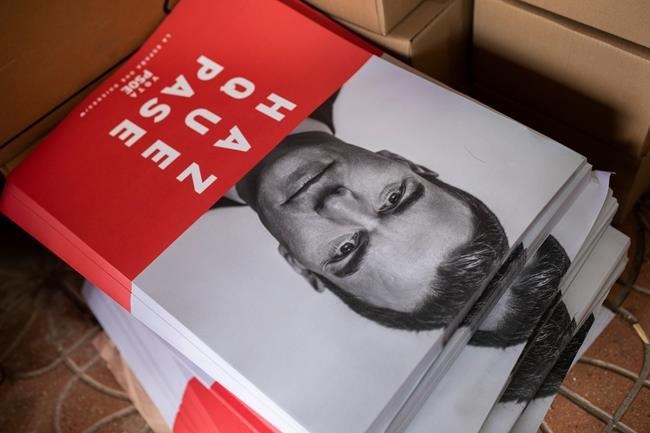
A poster of Spanish Prime Minister and Socialist Party candidate Pedro S·nchez is stored in a garage in Ciudad Real, Spain, Thursday, April 11, 2019. The campaign for the April 28 general election starts Thursday at midnight marked by a fierce fight for what polls indicate is a large pool of undecided voters. (AP Photo/Bernat Armangue)
Republished April 11, 2019 - 2:26 PM
Original Publication Date April 11, 2019 - 7:36 AM
BARCELONA, Spain - Spain's political parties are set to start campaigning for a general election this month in which the ruling Socialists are trying to remain in power and the extreme right is seeking to enter Parliament.
The official campaign period that starts at midnight Thursday promises to be a fierce fight for the large pool of undecided voters identified in election polls. Support from those voters could be key to whether the Socialist government led by Prime Minister Pedro Sánchez continues on or the election ushers in a coalition government made up of right-wing parties.
The national election on April 28 will be Spain's third in four years, a pace that reflects political fragmentation from the emergence of new parties.
Polls indicate the upstart far-right party Vox could win around 10% of the vote, adding a fifth national party of significant size to the Congress of Deputies, the lower chamber of the Spanish parliament.
A government opinion poll published this week forecast that the Socialist Party would displace the conservative Popular Party as the election's top vote-getter but fall short of winning enough for an outright parliamentary majority.
The government poll also found that that 41% of those polled were unsure how they would mark their ballots. The poll of 16,194 potential voters conducted March 1-18 was much larger than other polls in Spain.
Sánchez's most likely options for staying in power rest on either his Socialists maintaining support from the far-left Podemos party and some regionalist parties, or on striking a deal with the centre-right Citizens party.
The chances for new Popular Party leader Pablo Casado to replace Sánchez may depend on the how well the upstart far right party Vox performs. Vox, with its anti-immigration and ultra nationalist views, was crucial to the Popular and Citizens parties kicking the Socialists out of power in Spain's southern Andalusia region in January.
Drumming up votes for the Socialists is important, Sanchez said, because his is "the only party that can stop the three parties of the right."
"There is a clear risk that the parties on the right will join forces, and that is why it is important that we aren*t over confident and that we are aware that on April 28th we are called to the ballot boxes to ensure that this country advances," Sánchez told a rally in Seville on Thursday.
While Sánchez is running on his pledge to spend more on social programs, the most polarizing issue of the campaign will be the unresolved crisis from the Catalonia region's failed bid to secede two years ago.
Five separatist movement leaders currently on trial for the breakaway bid Spanish courts declared illegal are candidates in the general election. If found guilty of rebellion and other charges, they could be banned from holding public office.
Sánchez tried to mend bridges with the separatists before talks broke down. The Popular Party's Casado and Vox leader Santiago Abascal promise to punish them by taking away Catalonia(asterisk)s self-governance powers.
"On the 28th of April the nation's unity is at stake," Abascal told his supporters in Madrid on Thursday.
Sánchez became prime minister last June when Mariano Rajoy lost a parliamentary no-confidence vote after a court ruling in a corruption case involving ex-members of Rajoy's Popular Party.
Sánchez tried to keep his minority government afloat until the end of the legislative term in 2020, but ended up calling an early election after lawmakers rejected a national spending bill in February.
Spanish law limits advertising by parties and formal stumping by candidates to the 15 days before the election.
News from © The Associated Press, 2019